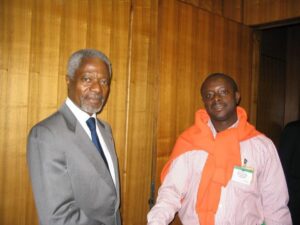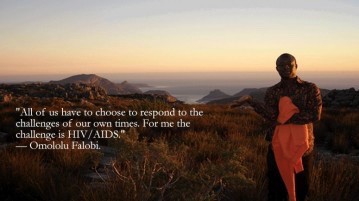Lekan Otufodunrin recalls the outstanding impact of the media advocacy by Late Omololu Falobi, former Features Editor of Sunday Punch Newspaper
On October 5 , 2006, Omololu Falobi, founding Executive Director of Journalists Against AIDS ( JAAIDS), a media-based Non-Governmental Organisation was killed in Lagos by unknown gunmen on his way home from work.
Among the various things that have been done in his memory is a calendar by JAAIDS dedicated to their late founder.
Titled “Omololu in our hearts”, I went through all the months in the 2008 calendar which had some memorable quotes either by Omololu or tributes to him and pictures.
As I read some of the quotes, I was struck about the impact a journalist can make if he really applies himself or herself to the job.
Although he never studied journalism, Omololu a graduate of Theatre Arts and Political Science had a vision of what he wanted to accomplish as a journalist and did.
“All of us have to choose to respond to the challenge of our time. For me, the challenge is HIV/AIDS “ Omololu stated in the January quote attributed to him.
For any journalist reading this, my question to you is what is the challenge you have chosen to respond to or plan to respond to? The graveyard is said to be filled with many dead people who never fulfilled their dreams due to procrastination.
Journalists are supposed to be agents of change. More than chronicling history in a hurry, at some point we may need to become advocates of a cause we are passionate about like Omololu did.
Jennifer Ehidiamen , a former youth intern at JAAIDS surfaces very apt in her tribute to Omololu in the February page: “Omololu Falobi did not tiptoe through life. Made an impact and dreamt a dream from which others can dream.”
Too many journalists ‘tiptoe’ through the profession waiting for the slightest opportunity to leave. If we can only appreciate the power of the media to make the world a better place, we will do everything to make the best of the opportunity.
“He knew the power of the media and he used it to pass on the message” Josephine Kamara, a former Resident Adviser, Internews Nigeria said in the April quote while acknowledging the role Omololu played in using the media to campaign against the spread of HIV/AIDS.
On the May page was the picture of Omololu shaking hands with the then Secretary-General of the United Nations, Kofi Annan. The meeting with Annan was a product of the diligence Omololu brought to bear to his work.

Omololu was not at the meeting as a reporter but as one of the leading stakeholders campaigning against HIV/AIDS. He was not satisfied with just reporting like many reporters do and lamenting that nothing can be done. He stepped forward to show how things can be done better in the anti-HIV/AIDS campaign.
“Omololu turned out to be one of those rare leaders in civil society that could translate his passion, intelligence and personality into a leadership role of an amazing mixture of vision, respect, energy, persuasion, humbleness, variation and authenticity” Marcel Van, of World AIDS campaign said in his tribute on the July page.
For journalists who feel inferior to other professionals, there is a lesson to learn from Omololu’s belief in himself as a professional. Chikwe Ihekweazu, a physician in his tribute published September of the year painted a picture of a journalist who believes in giving than receiving.
“In 2000…doing my MPh in Germany… I needed a list of NGOs working on HIV/AIDS in Nigeria. I did a search on the web, found Omololu, and sent him an email out of the blue. In a week’s time, I got a parcel via DHL.
“ He refused to accept that I pay for it. He said I was the same age as him and the more ‘young’ people like us got involved, this was payment enough. This was a journalist speaking to a physician!
“Journalists who demand payment from the people they report have a lot to learn from this man’s life…And how he lived it.”
I had heard people say journalism is a thankless job. I vehemently disagree. We may not get paid salaries commensurate with our work or acknowledged for our work, but the fact that our work can impact on the lives of many appreciative people we may not even know is indisputable.
Bunmi Iyare of Quality Life Project, Akure never met Omololu but the tribute he paid to Omololu is more than what money can buy.
“I never met him, but I know him. I know his work; I know the lives he touched. I know the message he chants, rants and raves. I know the difference he made on issues of HIV. I know the hearts he changed, I know the lives he has encouraged to move on and not to give up” Iyare was quoted to have said about Omololu’s impact on the December page.
Manju Chartani , Coordinator, African Microbicides Advocacy Group ( AMAG), Ghana also acknowledged the impact of Omololu’s advocacy campaigns in her tribute in 2008:
“He dedicated much of his life to fighting HIV/AIDS in Nigeria and in Africa. He set new standards for HIV journalism with the establishment of Journalists Against AIDS in Nigeria. He helped mobilize the Nigerian HIV/AIDS civil society in creating Nigeria-AIDS. He helped found HHVMAG and was one of the key leaders of the new African Coalition on HIV/AIDS”
Talk of a journalist of purpose who was consumed by his vision and used the power of the media to accomplish it, Omololu Falobi was one.

